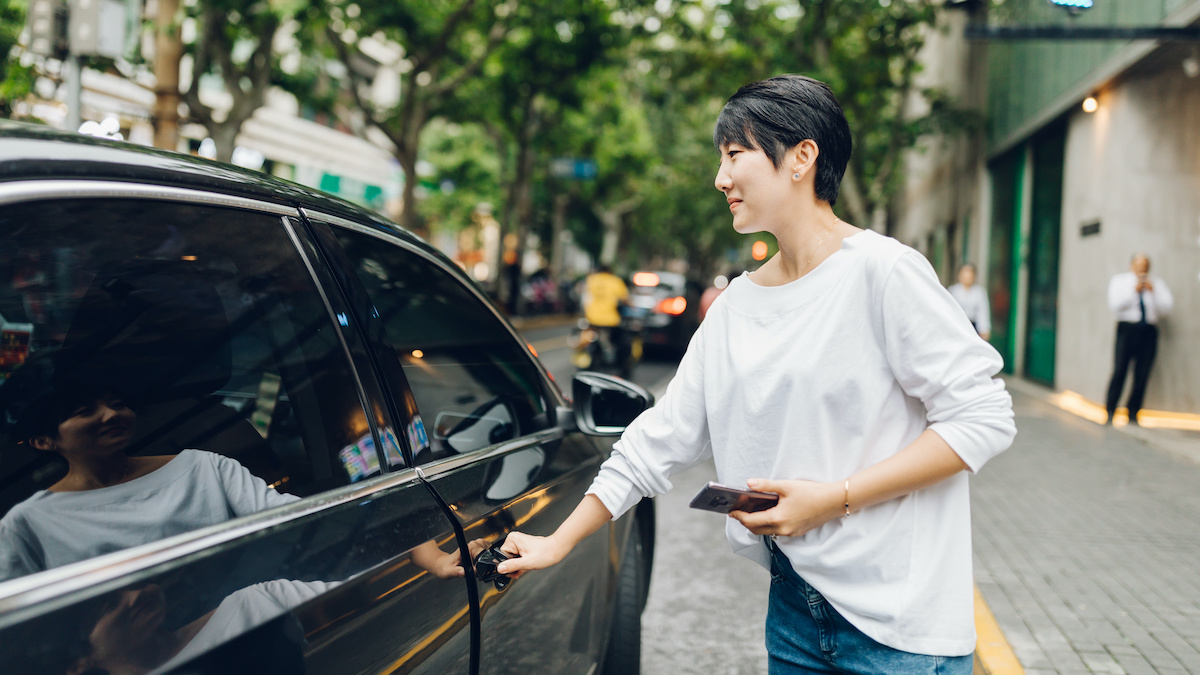

Around 42 percent of all ride-hailing driving time on average is spent waiting for and driving to pick up passengers. Asia-Pacific Images Studio / E+ / Getty Images
Ride-hailing services such as Lyft and Uber are creating more climate pollution and road congestion per trip than the transportation options they displace, according to a new report from the Union of Concerned Scientists.
Looking at data from seven major U.S. cities, the authors found that a non-pooled trip from a ride-hailing service creates 47 percent more emissions than the equivalent trip in a private vehicle with average fuel efficiency, partially due to the “deadhead” miles without a passenger that a ride-hailing car travels in between trips.
Around 42 percent of all ride-hailing driving time on average is spent waiting for and driving to pick up passengers, Reuters reported.
Worse still, ride-hailing trips create 69 percent more carbon emissions than if the passengers had opted to travel via public transportation, biking or walking. The authors said the increase stems from ride-hailing services increasing, not replacing, the total number of car trips by pulling passengers away from other, more climate-friendly methods.
“While ride-hailing trips today are higher emitting than other types of trips, we were encouraged by the fact that they can be significantly lower polluting with efforts to electrify and pool rides,” Don Anair, report author and research director of the Union of Concerned Scientists’ Clean Transportation program, told The Hill.
For the report, the authors analyzed publicly available data gathered in New York, Chicago, Los Angeles, Boston, Seattle, San Francisco and Washington. They also looked at previously published studies, including one commissioned last year by Uber and Lyft.
The ride-sharing industry has grown tremendously since Uber’s launch in 2010. Citing data from both companies, the report authors note that Uber and Lyft have accumulated a combined 11 billion trips as of 2018. At the same time, the transportation sector is now the U.S.’s largest source of human-generated greenhouse gases, according to the U.S. Environmental Protection Agency.
The report marks the first time researchers have tried to quantify the pollution impact of ride-hailing services, Reuters reported.
“Certainly the evidence to date points to an overall increase in greenhouse gas emissions associated with ride-hailing under current market conditions,” Giovanni Circella, director of the 3 Revolutions Future Mobility Program within UC Davis’ Institute of Transportation Studies, told Axios. The Institute of Transportation Studies provided some of the data used in the Union of Concerned Scientists report.
The authors found that ride-hailing companies can reduce emissions and congestion by switching more of their fleet to electric vehicles, encouraging customers to take more pooled rides, improving connections to mass transit and collaborating with governments on policy.
For instance, a pooled and electrified trip could reduce emissions by 68 percent compared to a private vehicle trip with average fuel efficiency, or by 79 percent when compared to a non-pooled trip in a ride-hailing vehicle. Currently, however, the authors estimate that only 15 percent of ride-hailing trips in the U.S. are pooled.
“When combined with robust public transit and safe places to bike and walk, electric, pooled ride-hailing has the potential to reduce the need to own a car and reduce overall emissions from transportation,” Jeremy Martin, director of Fuels Policy and senior scientist in the Union of Concerned Scientists’ Clean Vehicles Program, told EcoWatch. “But we’re currently a long way from that future.”
A Lyft spokesperson called the report “misleading” and touted the company’s efforts to electrify its fleet, encourage shared rides and partner with cities on sustainable transportation, The Verge reported.
In its own statement, Uber did not acknowledge the report, but referenced its existing sustainability goals which include support for reduced car ownership and greater use of green transportation, CityLab reported.
For ride-hailing to become truly green, the authors emphasized the need for more collaboration on these efforts.
“Companies, governments, and individuals all need to take action to make sure ride-hailing services like Uber and Lyft are part of a clean transportation system, rather than continuing to contribute to climate change and congestion,” Martin said.
Update, March 3: This story has been updated to include a quote by Union of Concerned Scientists along with some minor changes for clarity.
- Self-Driving Cars Could Cause More Pollution – Unless Electric Grid ...
- Can Uber and Lyft Be a Climate Solution? - EcoWatch
- Now Is the Perfect Time to Rethink Green Transportation

 233k
233k  41k
41k  Subscribe
Subscribe 